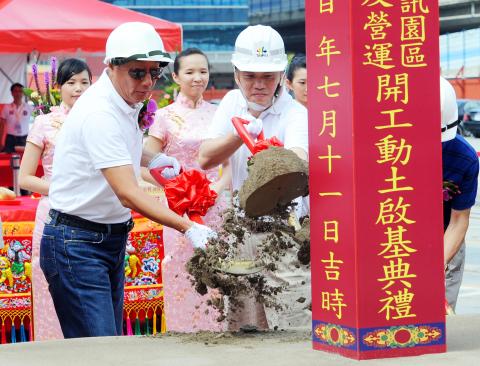Hon Hai Group (鴻海集團), Taiwan’s largest IT conglomerate, yesterday held a groundbreaking ceremony for the Taipei International IT Fashion Center (台北資訊園區), its first public project with the government.
Hon Hai, which assembles iPhone and iPads for Apple Inc, is building the center through a build-operate-transfer partnership with the Taipei City Government for NT$3.9 billion (US$135 million) and will operate it for 50 years.
Hon Hai chairman Terry Gou (郭台銘) spoke at the ceremony and said the group might explore more public tenders in the future, given its successful bid for the IT Fashion Center.

Photo: Lo Pei-der, Taipei Times
“We are an export-oriented company. We didn’t bid for public projects in the past as we had to take care of our own well-being,” Gou said, referring to the company’s profitability.
However, Taipei’s vision of utilizing downtown land to set up a tech mall to rival Akihabara, a famous electronics retailing belt in Tokyo, drew its attention.
As Hon Hai does not operate an own-brand business, the group is building channels through which it can sell tech gadgets — a business model that has already proven to be successful in China.
The company will also take advantage of its relationships with brand clients to develop user-friendly digital content to keep abreast of trends in technology, Gou said.
The IT center will be operated by Hon Hai’s affiliate SynTrend Creative Co (三創數位), which will rely on the experience of -Cybermart International Holding Co (賽博數碼).
Hon Hai set up Cybermart in China in 1999 to sell digital products, including computers, handsets and TVs.
There are currently more than 30 Cybermart outlets in several major Chinese cities. The retailer said in Taipei last week that the number would grow to 40 by the end of the year.
It also plans to open at least one outlet in Taiwan by December, with a total of 20 outlets in the long run, it said.
Gou yesterday said the group was planning to list Cybermart in Taipei. Cybermart chairman Steve Chang (張瑞麟) said the retail chain planned to spend 10 billion yuan (US$1.54 billion) over five years on expansion plans. Both declined to give a timeline for the listing.
The center, scheduled for completion in 2013, will have 18 floors (12 upper floors and six -underground parking lots) and is located adjacent to the Guanghua Digital Plaza (光華數位新天地).
Cybermart CEO Scott Chu (朱家義) told the Taipei Times in June last year that the center would be a retail space that would help to develop creativity, as it would offer young entrepreneurs a place to go “wild” and come up with ideas for new tech products.
Cybermart will assist these entrepreneurs in making their ideas take shape and, if feasible, even commercialize the ideas into gadgets to be sold across the globe, Chu said at the time.
Asustek Computer Inc’s (華碩) general sales manager Kevin Lin (林福能) yesterday said the center would offer a platform for branded firms to showcase their products to shoppers.
“With the city government backing the project, we feel confident about working with the mall,” Lin said.
Additional reporting by Bloomberg

Intel Corp chief executive officer Lip-Bu Tan (陳立武) is expected to meet with Taiwanese suppliers next month in conjunction with the opening of the Computex Taipei trade show, supply chain sources said on Monday. The visit, the first for Tan to Taiwan since assuming his new post last month, would be aimed at enhancing Intel’s ties with suppliers in Taiwan as he attempts to help turn around the struggling US chipmaker, the sources said. Tan is to hold a banquet to celebrate Intel’s 40-year presence in Taiwan before Computex opens on May 20 and invite dozens of Taiwanese suppliers to exchange views

Application-specific integrated circuit designer Faraday Technology Corp (智原) yesterday said that although revenue this quarter would decline 30 percent from last quarter, it retained its full-year forecast of revenue growth of 100 percent. The company attributed the quarterly drop to a slowdown in customers’ production of chips using Faraday’s advanced packaging technology. The company is still confident about its revenue growth this year, given its strong “design-win” — or the projects it won to help customers design their chips, Faraday president Steve Wang (王國雍) told an online earnings conference. “The design-win this year is better than we expected. We believe we will win

Quanta Computer Inc (廣達) chairman Barry Lam (林百里) is expected to share his views about the artificial intelligence (AI) industry’s prospects during his speech at the company’s 37th anniversary ceremony, as AI servers have become a new growth engine for the equipment manufacturing service provider. Lam’s speech is much anticipated, as Quanta has risen as one of the world’s major AI server suppliers. The company reported a 30 percent year-on-year growth in consolidated revenue to NT$1.41 trillion (US$43.35 billion) last year, thanks to fast-growing demand for servers, especially those with AI capabilities. The company told investors in November last year that

Power supply and electronic components maker Delta Electronics Inc (台達電) yesterday said it plans to ship its new 1 megawatt charging systems for electric trucks and buses in the first half of next year at the earliest. The new charging piles, which deliver up to 1 megawatt of charging power, are designed for heavy-duty electric vehicles, and support a maximum current of 1,500 amperes and output of 1,250 volts, Delta said in a news release. “If everything goes smoothly, we could begin shipping those new charging systems as early as in the first half of next year,” a company official said. The new